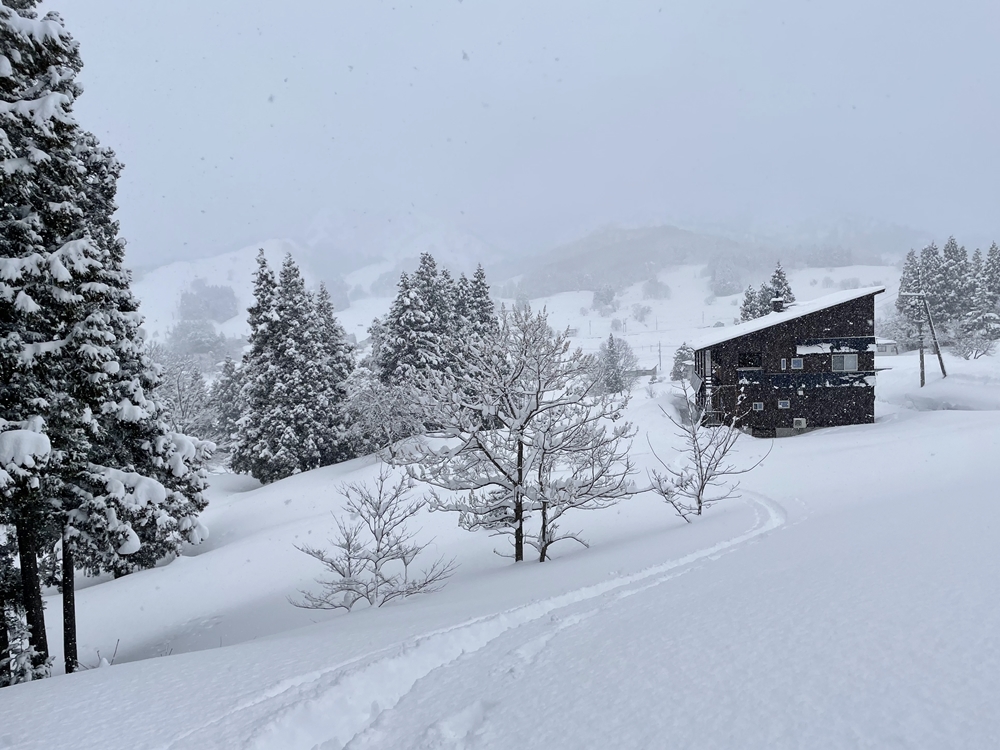Risa Obinata, who works as an editor mainly for the snow culture magazine "Stuben Magazine", moved from Shonan to Shinshu in 2020 and started her long-cherished rural life. She builds her half-built home, supplements electricity with solar power, and grows vegetables in the fields. And in winter, she skis almost every day. What did she discover new through living in nature, something she has admired for many years?
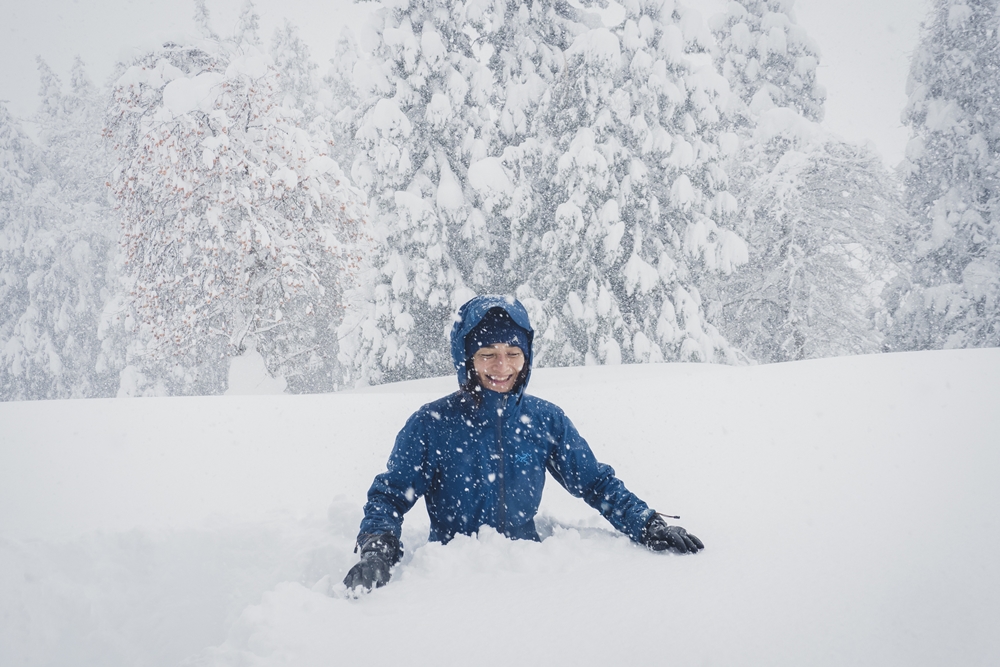
Born and raised in Tokyo, Obinata got a job at a publishing company after graduating from university. He was involved in the production of ski magazines such as "Ski" and "POWDER SKI", and also served as editor-in-chief. Seven years ago, he became independent and launched the snow culture magazine "Stuben Magazine" . Currently, she has moved to Iiyama City, Nagano Prefecture with her partner, and is expanding her activities as a freelance editor.
Longing for a life where everything “circulates” in nature
――Two years ago, I moved to Iiyama in the snow country. I feel that it would be more convenient to be in the Tokyo metropolitan area to work as an editor, but why go to the countryside?
Mr. Obinata (hereafter O) has been visiting ski resorts and surrounding towns for many years, and has seen "living in snow country". I wanted to try it myself.
In general, people tend to think that it is difficult and inconvenient because of the heavy snowfall, but when you actually interact with the people who live there, you can feel that it is truly "rich" in many ways. In an environment where nature is close at hand, self-sufficiency and local production for local consumption have been commonplace for a long time. When snow falls, the melted water is stored in the forest and irrigates the fields at the foot of the mountain. It grows crops and people eat nature's bounty. Everything is "circulating" throughout the year.
On the other hand, my life in my 20s and 30s was busy with editing work, using electricity until late at night, and eating at convenience stores. Despite writing articles about people living in snow country, I often feel a gap in my own way of life that is far from them. I came to think that someday I would like to live in harmony with nature.
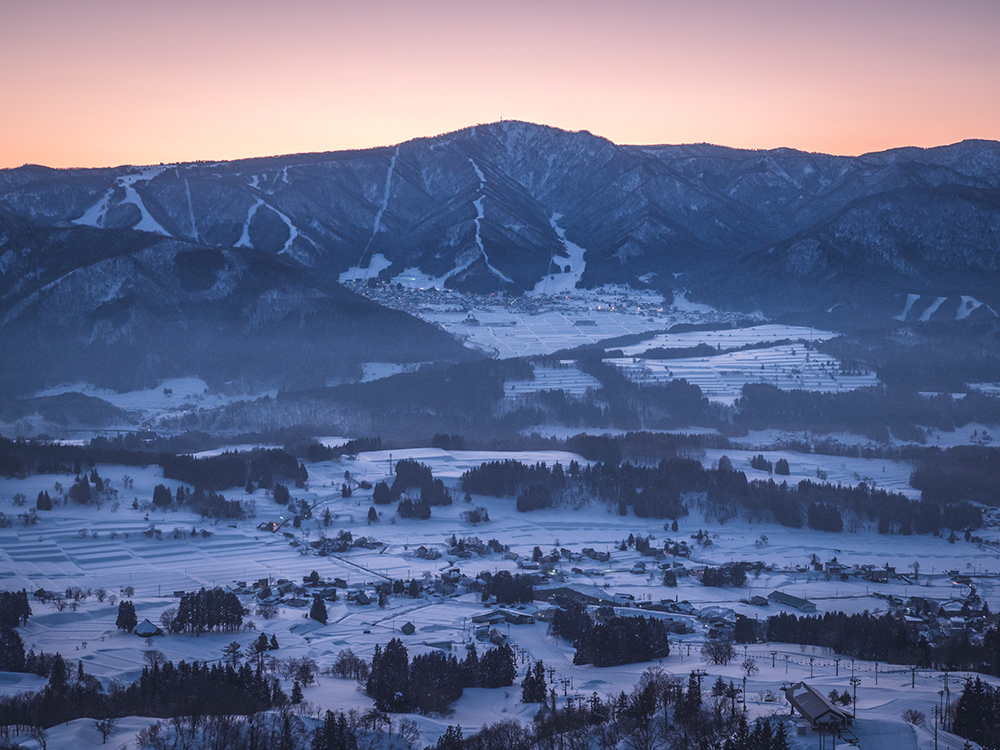
――I heard that the people you met through work and your skiing buddies had a big influence on you.
O When I was a newcomer who didn't know right or left, the editor-in-chief of the magazine "Ski" , left me alone to cover Niseko. At that time, Yoichi Watanabe, who later co-founded Stuben Magazine, was in charge of photography as a photographer. Since then, I have learned more about my work and skiing than my actual boss (laughs), and he is like my mentor.
Mr. Watanabe, who lives in Niseko, has been living with an awareness of the natural environment for quite some time. His home/office, built about 15 years ago, is highly airtight and highly insulated, and has a naturally low-impact design that takes air circulation into account. We plant trees in the garden to nurture the forest, and ask a local wood craftsman to use the trees that have grown and thinned out as tables in our home. It was a big deal for me to see the attitude of working like that from the side.
――Immigration in the midst of such a long-standing trend. So why did you choose Iiyama?
O This is a special heavy snowfall area designated by the country, and above all, it is an environment where skiing is familiar. Ease of coming and going to the Tokyo metropolitan area was also taken into consideration in connection with maintenance and preservation activities of "Matsunomori Kugenuma" in Kanagawa Prefecture Also, I was attracted by the good nature and the countryside that is not a tourist spot.
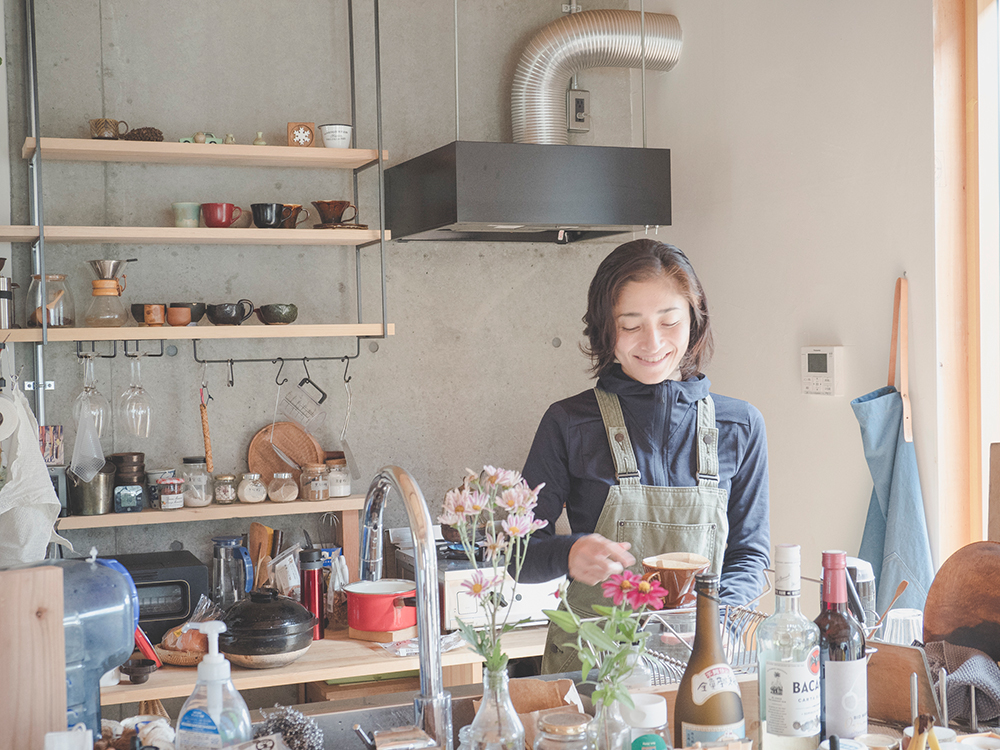
Aiming for a self-sufficient life as much as possible in the snow country
――The house that was completed in Iiyama is a half-built house where most of the parts are done by ourselves. There is a lot of commitment here as well.
O Luckily, I was able to come across a land with a superb view near a ski resort. Aiming to create a house that has as little impact on the environment as possible, we used natural materials such as wood from Nagano Prefecture and diatomaceous earth for the walls. On the 1st floor, we installed large windows to eliminate the boundary between the interior and exterior of nature, but we chose wooden sashes that are highly airtight to save energy. In winter, the main heating appliance is a wood-burning stove. This is also made by a manufacturer in the prefecture, and the firewood used is obtained locally and chopped by our partners. In the summer, you can grow vegetables in your own garden so you don't have to go shopping. In addition to being self-sufficient, I try to live a life that uses as little energy as possible.
――It seems that you are aiming for self-sufficiency in electricity by introducing a solar power generation system two years ago.
O I've been thinking about using natural energy for a long time. As I witnessed the effects of global warming every year, such as lack of snow at ski resorts, I wanted to live without relying on fossil fuels that emit carbon dioxide. It was during this time that I happened to meet a number of experts in solar power generation.
The solar panel, which is the cornerstone of the power generation system, is actually not good at "snow". Obinata's house overcame this by using a unique method of installing it on the wall under the eaves. Specifically, the panel is installed on the outer wall, not on the general roof. By setting an angle of 70 degrees, the snow slides naturally, and it is a mechanism that can receive sunlight efficiently. It was designed to generate electricity with high efficiency in the winter, when the amount of electricity used is high, but it has become an innovative model for the photovoltaic power generation industry, recording more power than expected by reflecting sunlight from the snow on the ground. rice field.
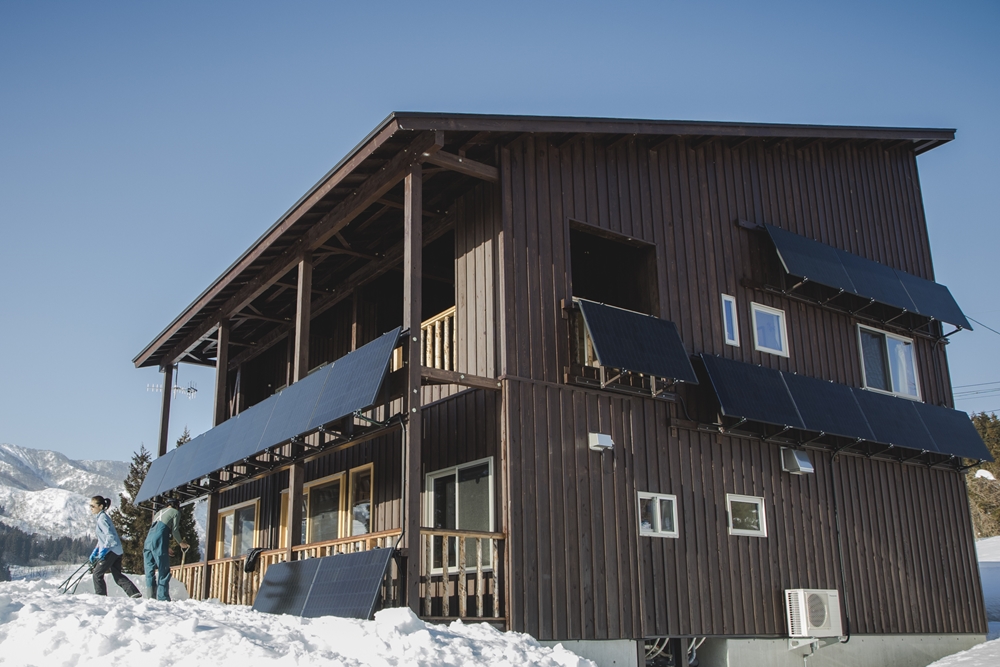
――Did your life change after you actually installed solar power generation?
O: There are many days throughout the year when I can only rely on solar power to support my life, which surprises me and gives me a great sense of fulfillment! The weather is nice today, so I've become conscious of the electricity that I used to take for granted. I think it's simply amazing that one's house can be a small "power plant", such as storing the electricity generated by the sun's light in a storage battery, and selling surplus electricity.
Of course, solar power generation itself is not uncommon, but it has been said that it is difficult to install a system in a snow country, especially in a heavy snowfall area like Iiyama. I am proud to say that It would be great if this kind of initiative could gain attention and spread in Japan, where about half of the country is covered by snow.
A rich life centered on skiing

――How do you live in winter?
O In high season, I go skiing first thing in the morning. I usually ski for about 1-2 hours, and when I come back, I remove the snow around my house while wearing my clothes. After that, desk work is a common flow of the day.
――How many days did you skate in the 21-22 season?
O About 80 days. Actually, it is about the same number of days as before migration, but the contents are completely different. Skiing is part of my daily routine now, and it feels like jogging in the morning. The Togari Onsen Ski Resort, home to the slopes, has a cozy atmosphere, and there are many non-compact snow slopes, so you won't get bored even if you ski every day. Because you ski every day, you can easily feel the changes in the snow and feel like you are interacting with nature.
Up until now, I've been planning to go skiing with a purpose, such as an interview, and I've been cramming my private time in between. Now I don't make any promises to anyone, I can choose the conditions. You can choose not to go, and you won't miss a good day. I think I can do it because skiing is part of my life.
――I envy you.
O Sometimes I don't go to the slopes and go to the mountain behind my house on skis. It's like taking a walk with your partner. When I don't see anyone, that kind of time is really fun and enriching, and I can also balance myself... I really wish I could have emigrated sooner.
――However, it is one of the most snowy areas in Japan, and there are many difficulties, isn't it?
O There was a lot of snow last season, and even if I shoveled the snow, it would be completely reset in a few hours, and then I would have to shovel the snow again, and so on. Besides, we don't have a snow blower at home, so everything is done by hand. Snow is the main focus of my life, and how I use my time depends on how much snow falls, such as making a schedule while checking the weather forecast. I am enjoying it as well.

――Did this kind of lifestyle have any influence on the book production of "Stuben Magazine"?
〇 "Stuben Magazine" has the concept of "transmission from the snow country". The editorial office is in Niseko, and until then, I frequently visited Niseko, traveled around the snowy mountains in Japan and overseas, and interviewed many voices of people living in the snow country. The reason why there are many articles on the natural environment and the unique culture of snow country, in addition to direct articles on skiing and snowboarding, is that we value the perspective of consumers. In that sense, now that I've finally become a snow country resident, I've become more sympathetic, and there are ideas that come to mind precisely because I coexist with snow.
Also, although it has only been three years since I moved here, I think that by getting involved in the local community little by little, my interest in the area where I live and the surrounding area will increase, and I will be able to conduct community-based news gathering and dissemination. I am thinking. It would be nice if I could objectively capture the charm of the area from an outsider's point of view because I am an immigrant.
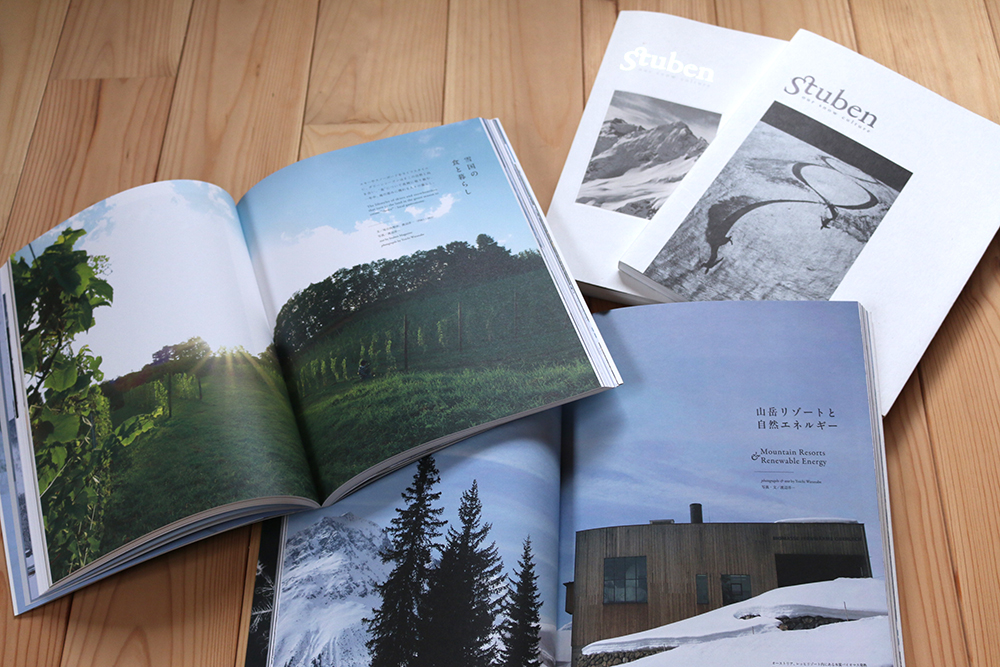
The second issue, "Mountain Resorts and Natural Energy," features European and Japanese regions that are progressively adopting energy that makes use of natural resources. In the 3rd issue, "Food and Life in Snow Country", we introduce people in Japan who use skiing and snowboarding as a lifestyle, and face nature during the green season, while directly addressing "food". If you are interested, please take a look. Back issues are Stuben Magazine online shop.
The sixth and latest issue will be published in late November. From June 10th, we will start crowdfunding as a new attempt. In addition to cooperating companies, we are seeking the cooperation of our readers to explore and challenge new methods of bookmaking. Click here details .
to protect the snow. What you can do because you are a slipper
――What specific things can we do now in order to continue to enjoy the blessings of nature in our lives in the future?
O As for my own efforts, for example, being conscious of energy saving, I stopped using rice cookers and microwave ovens, used eco-wrap and bamboo toothbrushes, and used natural materials that can be used without detergent without choosing plastic products. Using cloth to wash dishes, making shampoo and lotion by hand, and so on. It's a small thing, but I think the accumulation is important.

――Maybe growing vegetables in the field?
O I feel a great sense of fulfillment in being able to make what we eat by ourselves. Especially from spring to summer, we not only use our own vegetable garden, but also pick edible wild plants and share food from our neighbors. I go shopping less often, so I don't drive around and I don't use extra packaging. Above all, vegetables are delicious! I can feel that my body is also made of things on the ground. Garbage is composted and used as fertilizer for the soil in the fields. I wonder if this kind of "circulation" will help to maintain the environment little by little. Is it the secret to not being too stoic and just having fun doing it?
――It seems that living in Iiyama has been a great stimulus for you as a skier and as an editor.
O: It was skiing that gave me that kind of awareness. By coming into contact with nature, I came to feel strongly that I want to protect the field where we play and leave an environment where skiing can continue in the future. In the past, I just thought it would be nice to be able to ski, but now I'm grateful that there is an environment where I can ski. Especially in Iiyama, nature is so close that you can see the change of the four seasons. Under such circumstances, the desire to protect the environment becomes even stronger.
――What about your life in the future?
O Until now, I have traveled all over the place, and have been inspired by many glimpses of rich life wherever I go. This has been going on since my parents took me skiing and camping when I was a child. It wasn't until I moved and friends from the city came to visit me that I came to understand the feeling of welcoming them. You can have them eat your home-grown vegetables, give them as souvenirs, take them to pick wild plants, or guide them to places with beautiful scenery. I feel like an old lady in the countryside, and I'm proud of the countryside (laughs).
When I did that, my friends in the city and their children were very happy, and naturally we started talking about sustainable living, and they said that they wanted their children to go skiing. Children jump into nature and have various experiences while playing to their heart's content. Someday, it may be an opportunity to think about the natural environment more closely and make life richer. I would be happy if not only through the media, but also through my own family and friends, I would be happy if they could feel something through their own experiences.
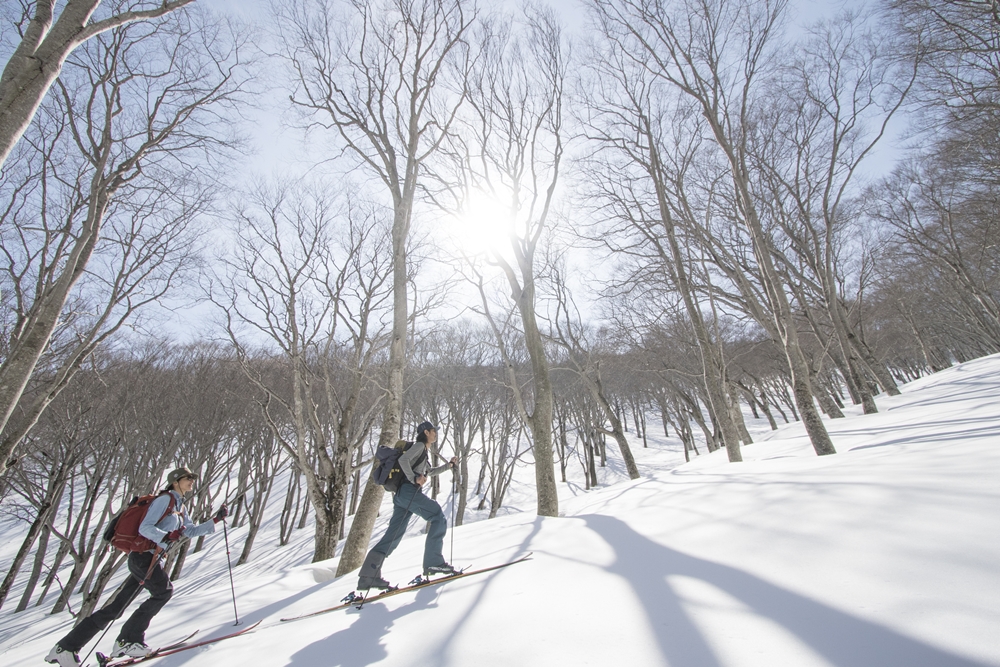
[Profile]
Risa Obinata Lisa Obinata
Born in Tokyo in 1980. After graduating from Waseda University's Second Literature Department, he was in charge of editing ski magazines such as "Ski" and "POWDER SKI" at Jitsugyo no Nihonsha for 13 years. Since 2013, she has been the editor-in-chief of the magazine. She went independent in 2015 and was involved in the launch of "Stuben Magazine" Since 2018, he has started preservation activities for historical buildings and surrounding greenery at his home in Kugenuma, Fujisawa City. In 2020, he moved from Shonan to Iiyama City, Nagano Prefecture, and is practicing a natural lifestyle that is close to the snowy mountains and nature.
Photo: Takanori Ota, Lisa Obinata

